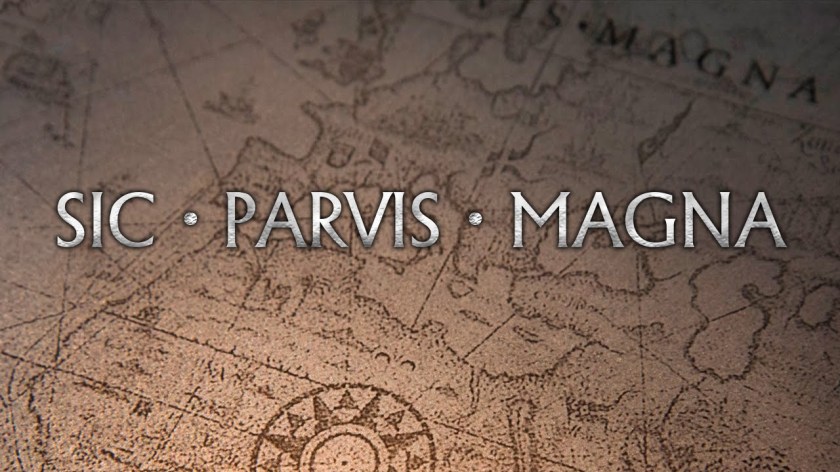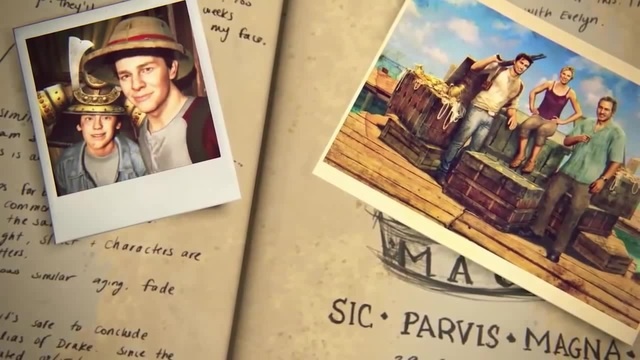
Uncharted 4 deserved every bit of acclaim it received when it was released back in May last year. It’s visually stunning, has amazing locations, the adventure is a blast, the characters and their dynamics are so vivid that they seem to be four-dimensional and the story is engaging. But it’s the underlying element of “Sic Parvis Magna,” the inscription all Uncharted fans are very familiar with, that packs the biggest punch in the fourth game. It’s something that I still think about from time to time, and I wanted to spread some more recognition about it, which is scarcely written about.
Though I’ve always been a huge fan of Uncharted’s ability to balance its action with its story, its heart is something that started with a faint pulse before growing into the strong heartbeat it has today. It truly is the embodiment of “greatness from small beginnings.” As the games progressed, there were some dark moments as the series delved more into Nate’s story, which is something it started leaving breadcrumbs in with the third entry.
In one of the most meaningful moments of the Uncharted 4, we learn more about Nate’s mom. Now Cassandra means “shining upon men” in Greek so I’m unsure of the rationale behind Naughty Dog’s decision to name her, but it’s so aptly fitting that I’m hoping it’s more than a coincidence. We finally learn more about her from Nate’s flashback as well as his own back story. My interest in his past was first piqued upon hearing Katherine Marlowe deeply cut him with it in Uncharted 3, taunting him about his mother committing suicide and him ending up in an orphanage.

In the 4th game, learning about how his mother challenged historical notions, did extensive research, made impressive journals and drawings, and had her own adventures and chased after legends made my heart burst. This was the reasoning behind Nate’s life, his passion. It all started with his mom. He grew up savoring legends too and wanted to continue her work. He admired her, learned from her and emulated her. To learn she was the inspiration for Nate’s own adventures was so touching, not to mention incredibly awesome since you rarely find male characters so affected by their mother/their interests. It was a beautiful realization and a wonderful story decision that I am deeply grateful to Naughty Dog for creating.
As we’ve seen from Nate’s journey in Uncharted, he wasn’t born into the best circumstances, he’s dealt with his fair share of loss and disappointments, and he’s held onto the stories and the myths and historical knowledge as if they were his own quests, chasing after the remnants of glory of other historical figures. We’ve seen him come close to being consumed by this in many cases, proving Nate is the unluckiest luckiest paradoxical character. A lot of the time he’s had help from the beloved Uncharted gang of Chloe, Elena and Sully. In fact as Sully famously tells Nate at the end of Uncharted 3, “We don’t get to pick our start in this life. Real greatness is what you do with the hand you’re dealt.” It’s one of the best lessons that I’ve ever learned, but it doesn’t really sink in for Nate until the last game.
In Uncharted 4, which had the most layered story in the series, we see the most evidence of the dangers of letting our passions consume us. Along the way are notes of past Libertalia colonists and pirates who turn on each other, Sam’s obsession with beating Rafe and getting the treasure, and Rafe also becoming so consumed with vengeance he turns on his own partner, Nadine. As we know from the third game, even Nate’s own mom became depressed and committed suicide. Though the game never explicitly states why, I suspect it’s because we find out in the fourth game that she never completed her own Henry Avery quest.
Nate however was finally able to prove to himself that his life meant more than following in someone else’s footsteps. He managed to outlive his obsessions and Libertalia, unlike the table full of dead pirates whose greed caught up with them. He made his own family with Nate and Elena, forgave his brother Sam and managed to create his own adventures instead of having them dictate his life. This struck a chord with me because in a world full of social media updates and technology usage, Uncharted 4 helped me come to terms with the barrage of adventures and things going on around me, which can really bog you down. Seeing other success stories and journeys, especially while you’re trying to create your own path, can be distracting.

In the final emotional scene it shows a photo of Nate, Sully and Elena and a drawing of Sir Francis Drake’s ring with “Sic Parvis Magna,” which is the perfect final shot. I’m really glad that Naughty Dog showed an epilogue to the epilogue, not because I think “settling down,” which is a popular ending choice in the media, is the right solution. No, it’s because in seeing an aged Nate you see someone who found success later in life. You see evidence of the adventures Elena and Nate are still doing. You see wrinkles and grey hair and hear him and Elena regaling their daughter Cassie about their own stories this time. Nate and Elena showed that you can have a family, and own a house in one place, and be a little “normal” while still being adventurous. Nate showed that sometimes the glory we get in life is the one we make for ourselves with the people we care about by doing what we love, regardless of fame or fortune. It’s staying true to ourselves, recognizing that our dreams do not necessarily determine our fate and making our own adventures with the situations we’re in. Your life is pretty darn awesome and you have the power to create it.
Sic Parvis Magna, indeed. Thank you, Naughty Dog.

Great post. The Uncharted franchise is easily one of the best I’ve ever played. While Nathan’s story has come to an end, it’ll be interesting to see where Naughty Dog takes the franchise from here
LikeLike
Thank you kindly, Paul! I agree, it’s one of the best series so even though Nate’s story is done, I am a little consoled by the fact that Chloe will be starring in the next game. I’m excited to see more of that.
LikeLiked by 1 person